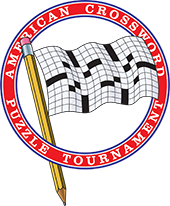Puzzling competition: Tournament attracts 'cruciverbalists'
Source: Boston GlobeDate: March 27, 1997
Byline: Kathleen Burge
Puzzling competition: Tournament attracts 'cruciverbalists'
STAMFORD, Conn. In the nail-biting finale of the American Crossword Puzzle Tournament, the room is silent except for the tinkling of chandeliers. It's anathema to cheer, clap, even whisper -- the noise might break the puzzlers' concentration.Standing on the stage before a giant crossword grid, Ellen Ripstein, a 44-year-old proofreader from New York, struggles to come up with an eight-letter word meaning "good buddy's acknowledgement." (The answer: tenroger.) Her left hand, holding the list of clues, trembles. Her rival, Doug Hoylman, a 52-year-old actuary from Maryland, pushes up his black-framed glasses and zips through his final answers. At 63 Across, "a graceful swallowlike bird," he scribbles, "beeeater."
Then Hoylman, announces, "Done." He has finished the puzzle in 12 minutes, 19 seconds, winning $1,000 in the world's oldest crossword puzzle tournament. It is a new record.
Ripstein finishes 34 seconds later, placing second. Although she has finished in the top five 14 times, she has never taken first. Her peers call her the Susan Lucci of the puzzle world after the soap star perennially nominated but never chosen for an Emmy.
Hoylman and Ripstein are celebrities among the "cruciverbalists" or "solvers" (two names that crossword puzzle fans give themselves) who have faced off annually in Stamford since 1978. But most of the 300 puzzlers who came to the tournament last weekend had no delusions of winning.
"It takes a solitary hobby and makes it a social event," said Judy Wolff, 44, a technical writer and editor from Acton who has competed for 18 years. Four years ago, she ranked third in her division; this year she placed 55th overall. "I see myself getting slower and dumber every year," Wolff lamented.
Two other participants who came mostly for the challenge and camaraderie this year -- they consider themselves rookies -- are Rosemary Enright and her husband, William Slattery. In the tournament's sixth puzzle, Enright, a computer analyst, finished with nine minutes to spare. Her husband finished about six minutes later. She reminded him of her lead on the elevator ride back to their room.
"That's divorce-ville," Slattery muttered.
All of the competitors work on seven puzzles through the weekend, sitting at tables in a ballroom at the Stamford Marriott. The puzzles are handed out, face down, until tournament host Will Shortz announces, "On your mark, get set, go!"
Puzzlers, judged on speed and accuracy, have between 15 and 45 minutes per crossword. The three people who have done the puzzles in the shortest amount of time with the greatest accuracy go on to the play-off. The three final competitors in this year's tournament were Hoylman, Ripstein and Trip Payne, 28, a professional puzzle-maker from Atlanta.
Tournament host Will Shortz, 44, editor of The New York Times crossword puzzle, is something of a cult hero among puzzle fanatics. "You don't get to see the guru but once in a lifetime," said a woman seeking his autograph.
Shortz, who in the early 1970s was able to convince academicians at Indiana University that puzzles were a serious field of study, holds the world's only college degree in enigmatology. In choosing puzzles for the tournament, he relishes clues that are not what they seem.
For instance, one clue that aggravated puzzlers last weekend was "Sign of freshness?" The answer: Slap. Another clue teased, "Degree alternative." While puzzlers conjured up terms for education and temperature, the puzzle-maker had been thinking deodorant. The answer: Arrid.
"For an expert audience like this, it's perfect," Shortz said, quick to defend the clues. "It twists your brain. You've got to have a flexible mind."
Some hard-core competitors like Payne train for the tournament, solving dozens of puzzles in the weeks before Stamford. During competition, Payne reads the next clue while his hand is still scribbling the previous answer. Other puzzlers save time by substituting a lower-case "e" for the long strokes of the capital letter. This technique is reportedly used by President Clinton, a crossword afficionado said to polish off the Sunday New York Times puzzle in 20 minutes, in ink.
Payne was 24 when he won the tournament in 1993, the youngest champion ever. This year, he arrived at the playoff in first place, but finished third, well behind Hoylman and Ripstein. In the finale, Hoylman solved the crossword methodically, top to bottom, his hands steady. It was true to form for Hoylman, who is known for being taciturn. Although words stream easily from his pencil, few flow from his lips.
On stage, Payne was Hoylman's foil. He skipped around the grid, filling in answers here and there. He sighed and shrugged when he was stuck. He impatiently waved off the light of a television camera.
"What a contrast in form," murmured one judge.
Missing from the playoff was Jon Delfin, a New York musician who has won the tournament four times.
Delfin's downfall was a clue that read: "Egg head?" He wrote "ovi," but the correct answer was "ovo."

